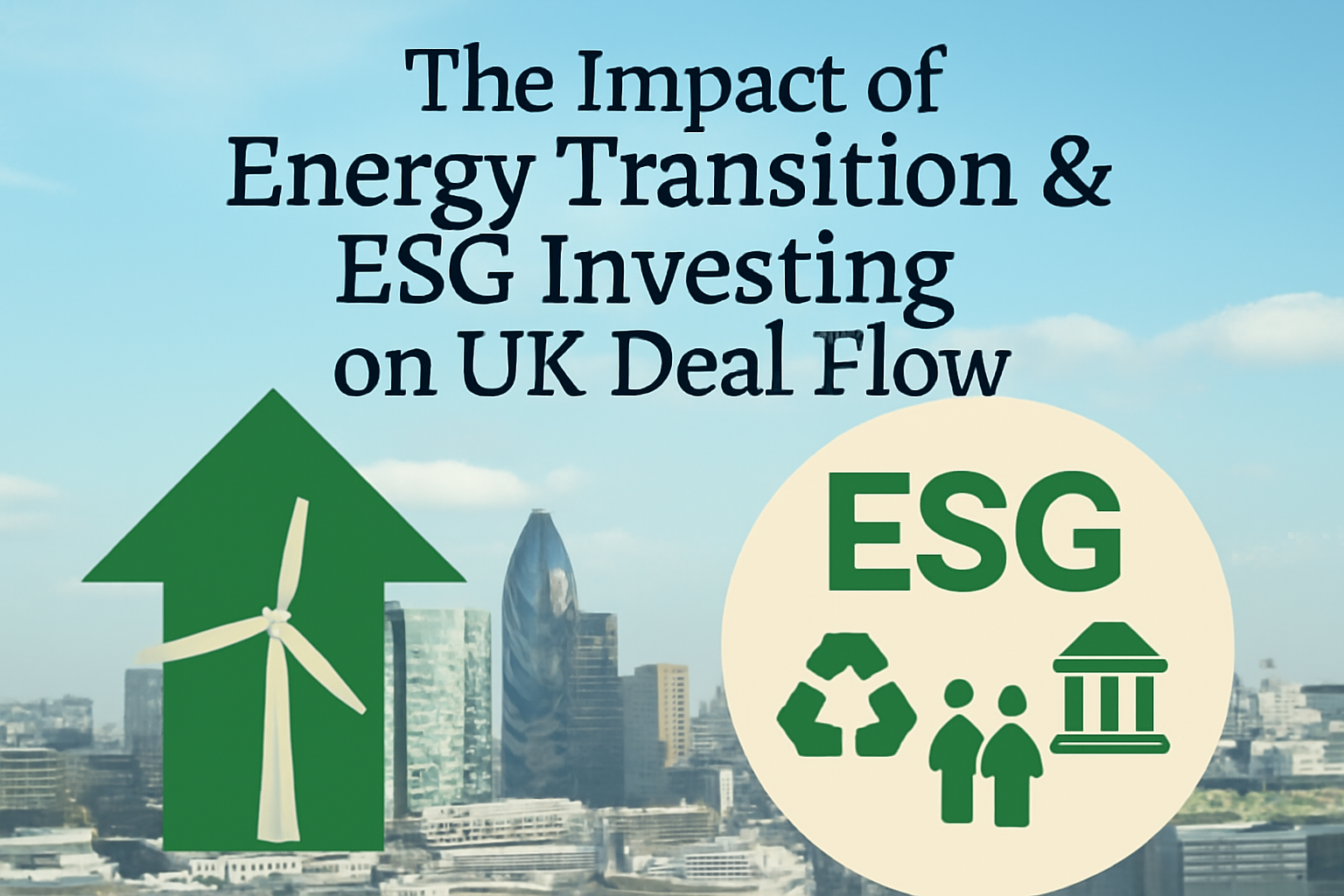The evolving landscape of energy transition and Environmental, Social, and Governance (ESG) investing is reshaping the M&A (Mergers & Acquisitions) deal flow in the UK. As both regulatory pressures and investor preferences push companies to adopt sustainable practices, the role of ESG factors in business transactions has never been more prominent. In this article, we explore how these global trends are influencing UK deal flow, and what they mean for the future of mergers and acquisitions in the country.
Energy Transition: A New Era for UK Businesses
The UK is at the forefront of energy transition, with the government’s ambitious net-zero targets by 2050. Businesses across sectors are increasingly incorporating clean energy solutions, reducing carbon footprints, and shifting to greener technologies. This transition opens up new avenues for M&A activity, as companies look to acquire or merge with businesses that have strong sustainability credentials or innovative green technologies.
One key driver is the growing demand for renewable energy sources, such as wind, solar, and hydrogen. As traditional energy companies pivot towards sustainable alternatives, we are witnessing an increase in deals that support green energy ventures. “The energy transition is not just about reducing emissions; it’s about tapping into the growing market for sustainable technologies and infrastructure,” says Jamal Khan, CEO of Churchill Mergers. “This shift is pushing companies to seek strategic partnerships, acquisitions, or even divestitures in line with their environmental goals.”
ESG Investing: Driving Deal Flow in the UK Market
The rise of ESG investing is another significant factor reshaping deal flow in the UK. With investors becoming more conscientious about the social and environmental impacts of their portfolios, there is a growing preference for companies that demonstrate robust ESG practices. UK businesses, especially in sectors like finance, technology, and real estate, are aligning their strategies to meet investor expectations regarding transparency, sustainability, and ethical governance.
The integration of ESG principles into investment decisions is altering the way deals are structured. Companies that score well on ESG metrics are commanding higher valuations, while those with poor sustainability records may face challenges in attracting investment or securing favourable deal terms. Jamal Khan elaborates, “ESG investing is not just a trend; it’s a fundamental shift in how businesses are evaluated. Companies that align with these values are better positioned for long-term growth and can secure more attractive financing options.”
Influence of Regulatory Changes on M&A Activity
The UK’s regulatory environment is also playing a pivotal role in shaping ESG-driven M&A activity. The introduction of stringent regulations related to climate change, environmental protection, and social responsibility is forcing companies to reassess their operations and business models. In response, many businesses are turning to acquisitions and mergers to bolster their sustainability credentials or comply with new regulations.
One such regulation is the mandatory climate-related financial disclosures for large companies, which was introduced as part of the UK’s commitment to the Paris Agreement. These disclosures provide transparency around companies’ environmental risks and opportunities, influencing both investors and M&A advisors to evaluate businesses through an ESG lens. This regulatory shift encourages strategic transactions that help companies improve their ESG profiles and meet compliance requirements.
The Role of Private Equity and ESG-Aligned Capital
Private equity (PE) firms are increasingly incorporating ESG considerations into their investment strategies, with many firms focusing on building portfolios that prioritise sustainability. As a result, private equity-backed companies are actively seeking acquisitions that complement their ESG goals, creating a more dynamic M&A environment. “PE firms have recognised the potential for high returns in the green economy, and are aligning their investment strategies with long-term sustainability objectives,” says Khan. “We are seeing significant interest in renewable energy projects, green infrastructure, and technologies that promote sustainability.”
In addition, ESG-themed funds are emerging as key players in the UK M&A market. These funds focus exclusively on companies that meet specific ESG criteria, such as environmental impact reduction, social responsibility, and corporate governance practices. As these funds grow in size and influence, they are increasingly driving deal flow in sectors such as clean energy, technology, and consumer goods.
Conclusion: Navigating the ESG-Driven M&A Landscape
The energy transition and ESG investing are transforming the UK’s M&A landscape, driving deal flow and reshaping the way businesses approach growth and sustainability. As more companies integrate ESG into their core strategies, we can expect an increasing number of transactions focused on environmental, social, and governance considerations. For M&A advisors, understanding the nuances of these trends and staying ahead of regulatory changes will be critical in guiding clients through successful deals.
As Jamal Khan aptly concludes, “The intersection of energy transition and ESG investing presents significant opportunities for businesses that embrace sustainability. However, it also requires careful consideration and strategic planning to ensure long-term value creation in a rapidly evolving market.”
As we look to the future, it is clear that ESG factors will continue to play a central role in the UK’s M&A activity, providing a compelling path for businesses to adapt, grow, and thrive in an increasingly green and responsible economy.


